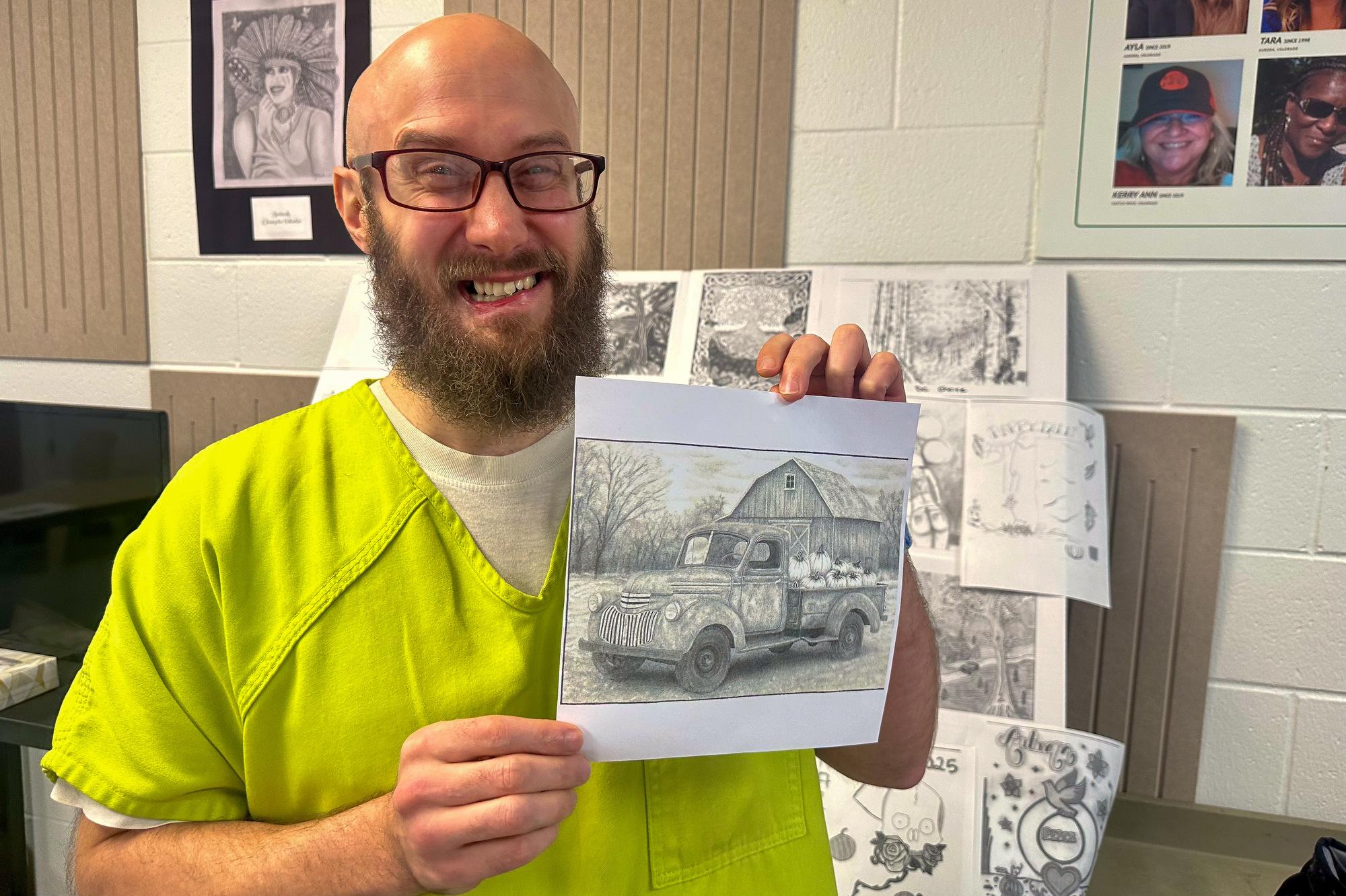
Colorado Republicans last night chose Darryl Glenn as their candidate for U.S. Senate. He hopes to unseat incumbent Democrat Michael Bennet in November.
Glenn is an attorney, El Paso County commissioner and retired Air Force lieutenant colonel. He was the only candidate to get on the GOP primary ballot through the caucus-assembly process. In a spirited speech at the state Republican convention in April, Glenn called himself an “unapologetic Christian, constitutional conservative, pro-life, Second-Amendment-loving American.”
He has since earned the backing of many prominent Republicans, including former Alaska governor Sarah Palin and Texas Sen. Ted Cruz who, when he was a presidential candidate, won the support of Colorado Republican delegates at that same state convention.
Glenn spoke with Colorado Matters host Ryan Warner.
On why he believes he's qualified to be Colorado's next U.S. senator:
"For me it's about leadership. The one thing about leadership is recognition in the fact that you have to spend time getting out there, talking to people because I can tell you, universally what I heard across the state, it doesn't matter if you're Republican, Democrat or unaffiliated, they're frustrated in the fact that they don’t feel like their elected representatives are actually listening to them. And that's the one quality that I bring to this race."
On if he supports GOP presumptive nominee Donald Trump's stance to build a wall on the U.S.-Mexico border:
"[Trump] has a vision. But the role of the Senate and the role of the House, they need to understand that it's a separate, but equal branch of government and that's what I haven't seen as far as leadership being able to work together on these issues. My focus is... the defense of this country and we need to be able to identify the enemy and do what's necessary to make sure that we secure the borders and be able to come up with a plan for radical Islamic terrorism. That might be looking at some improvements along our border but we first have to identify the enemy and then come up with a strategy, working with whoever is going to be president, on how to accomplish that objective."
On "energy independence" and the coal industry:
"There have been some technological advances with using cleaner coal, but what we need to do is have a balanced portfolio. We need to look at all energy options. What I don’t support are subsidies, putting one energy source over another. But what I do believe is we need a firm commitment into becoming energy independent. But we also need to look at the unintended consequences of some of our policies because if some of our policies are essentially causing us economic harm by way of job losses and shutting down livelihoods for individuals."
- After Victory In Crowded Senate Primary, Republican Glenn Narrows Focus To Bennet
- Political Watchers Look At Colorado U.S. Senate Race
- Bennet Holds Massive Fundraising Edge Over Glenn In Colorado Senate Race
Read the transcript:
Ryan Warner: This is Colorado Matters from CPR News. I'm Ryan Warner. Colorado Republicans have chosen Darryl Glenn as their candidate for US Senate. He hopes to unseat incumbent Democrat Michael Bennet in November. Glenn was the only candidate to get on the GOP primary ballot through the caucus assembly process, as opposed to gathering signatures and petitioning on. He has earned the backing of many prominent Republicans, including former Alaska Governor Sarah Palin and Texas Sen. Ted Cruz. Glenn spoke with me last night from his victory party at the Broadmoor Hotel in Colorado Springs. Darryl Glenn, congratulations and welcome to program. Darryl Glenn: Thank you very much. It's a pleasure to be here. Warner: You want to be a member of one of the most powerful bodies in the world, the U.S. Senate, which has a hand in of course domestic and foreign policy. What's the single most-important thing you think qualifies you for the job? Glenn: Well for me it's about leadership. The one thing about leadership is recognition in the fact that you have to spend time getting out there, talking to people because I can tell you, universally what I heard across the state, it doesn't matter if you're Republican, Democrat or unaffiliated, they're frustrated in the fact that they don’t feel like their elected representatives are actually listening to them. And that's the one quality that I bring to this race. Warner: And what about your background makes you good at that? Glenn: Well, I grew up in a military family. I'm an Air Force Academy graduate, a retired lieutenant colonel with 21 years in the military. I'm a small business owner. I'm the father of two adult children plus I'm a, been a city councilman for eight years and now I'm the County Commissioner. So I bring a broad spectrum of experience but the one thing I have is a servant's heart, somebody that's willing to go out there and actually sit down and talk to people and find out what the issues are and that's what separates me from Mr. Bennet. Warner: Mr. Bennet has held any number of town hall forums in the state. What makes you think he isn't listening to the people of Colorado? Glenn: Well the people that I've talked to have not seen Mr. Bennet, but the one thing they are going to do is they're going to see me. I'm going to go out there and talk to people, I'm going to go out there and make sure that they understand that their voice has been heard. So when they think about how angry they are about the Iran Nuclear Deal; how angry they are about Obamacare; how angry they are about the excessive regulations that are forcing them to lose their jobs and adjust their quality of life, I'm going to be the one that's going to be out there that's championing and fighting for them. Warner: We will dive into some of those issues in just a bit. But Darryl Glenn you've called yourself an "unapologetic Christian, constitutional conservative, pro-Life, Second Amendment-loving American". And moving into this general election, where you'll be looking to court unaffiliated voters, the largest voting bloc in the state, will you add other descriptions that might broaden your appeal? Glenn: Well what that does. That actually encompasses everything that unaffiliateds and Democrats and Republicans should be united about. Because why I say that is because I am exercising my First Amendment right and that's the one thing that this administration and Mr. Bennet has basically has suppressed. We have a First Amendment right and we should be proud to be Americans, we should be proud to be able to be bold and brave and proudly proclaim who and what we are. It doesn't mean that we're asking anybody to do that or adopt our beliefs or be exclusionary, it's recognition in the fact that we live in the greatest country. And this country is great for Republicans, Democrats and [unaffiliated voters], and we can come together and be Coloradans. Warner: Well I hear a lot of what sound like campaign slogans and you know terms like the First Amendment and things like that. But I'm not getting out of that how you appeal to a moderate voter in Colorado. Glenn: Well, I believe all parties, it doesn't matter whether you are a staunch conservative, or moderate whatever, every single one of us want to make sure we live in a country that's safe. Every single one of us want to make sure that we have energy independence so that we don’t have to rely on enemies of this country to be able to do this. Every single one of us understands fiscal responsibility and we recognize the fact that we can't spend more money than what we have coming in. So these are issues that transcend party and that's something that we're going to continue to do and unfortunately the policies that Michael Bennet has supported are in direct contradiction to that. On Trump's Wall And Muslim BanWarner: At that point Glenn had to rush off, he was surrounded by other reporters but we were able to pick up the conversation by phone earlier this morning. You have endorsed Donald Trump and I'd like to get to some of Trump's marquee stances, which would likely involve the US Senate. So first off, do you support building a wall, more of one, along the U.S.-Mexico border and having Mexico pay for it? Glenn: Well it's one of these things where you know Donald Trump, he has his vision and what I want to do is make sure people understand he has a vision. But the role of the Senate and the role of the House, they need to understand that it's a separate but equal branch of government and that's what I haven't seen as far as leadership being able to work together on these issues. My focus is, just like I said it was our number one objective here from Colorado, is the defense of this country and we need to be able to identify the enemy and do what's necessary to make sure that we secure the borders and be able to come up with a plan for radical Islamic terrorism. That might be looking at some improvements along our border but we first have to identify the enemy and then come up with a strategy, working with whoever is going to be president, on how to accomplish that objective. Warner: That does not sound like an open embrace of Trump's wall policy. Glenn: Well, I think you're putting words in my mouth. What it says is that we're a separate but equal branch, you have to have a discussion. Your commander in chief, your president, has to have a vision, but when you have that vision you also need to work collaboratively with Congress to come up with how do we actually execute that. We do need some border and port security, but it's about us standing together. It's about Congress stepping up and doing their job for once. Warner: Do you think that there should be a temporary ban on Muslim immigration to this country? Glenn: What I'm concerned about, we have to be able to identify threats to our country and because right now we have not been able to secure our borders, there are people that are coming into our country that are potentially wanting to do us harm. We have to be able to come up with a way to identify those people and to make sure that we prevent that. That should be the focus. Warner: And should that system rely solely on someone's faith as a screen? Glenn: Well what I think is you need to identify what are the threats and that's really more behavioral that you need to be able to identify because think about it from a practical standpoint. If your enemy knows what your rules of engagement are, your enemy is going to be smart enough to be able to adapt. What we need to do is identify criteria that we can clearly identify people that are threats to this country, come up with a strategy for dealing with that. But we certainly should not forecast those rules of engagement. Because once your enemy knows what those are, they will exploit those. So we have to be very careful with doing that but we must be diligent and realize that there is a real threat to this country. Warner: So you say that it ought to be based more on behavior than solely on someone's faith. Do you break then from Trump on the question of a temporary ban on Muslim immigration? Glenn: I know you want to keep going there but like I said, I stand by my statement and the fact that he has his policy. The way I look at it as far as being able to work collaboratively with that, I understand that there are threats to this country and we have to be able to identify, come up with a criteria, and that criteria is yet to be determined on how we absolutely identify those people so that we can prevent those threats from happening. Warner: I guess what I don't understand is that you've endorsed Trump and you'll be down-ballot from him, presumably, he's the presumptive nominee, yes, I do want to go there. In other words, I want to know where you stand on his specific policy issues. I'm wondering why you're reluctant to go there. Glenn: I'm not. I have my own agenda as far as I'm doing my job as far as leading. And we can keep doing this all day but I'm going to stand by my statement and the fact that he has his platform that he needs to run on. When you are running as a senator or congressman, you realize as Congress, you have a separate but equal branch. Both branches working collaboratively need to come up with a strategy. And my strategy, I've already articulated that. On "No-Fly, No-Buy"Warner: I'd like to ask about the "no-fly, no-buy proposal." The idea that if your name appears on the no-fly list, you shouldn't be able to buy a firearm. This is obviously in the news after the Pulse Orlando shooting. Just yesterday in Denver there was a gunman who walked into an office building. What do you think about "no-fly, no-buy" just fundamentally as an idea? Glenn: Well fundamentally I've yet to see a list that is essentially has captured people that are threats to this country. One of the things that I'm concerned about are the due process rights for any and all individuals, it doesn't matter if you're a Democrat, Republican, or unaffiliated. It doesn't matter if you support the Second Amendment or not. When you start thinking about being an American, and having your due process rights and having somebody limit access to normal things that you should be entitled to, that's very troubling, if you don’t have the ability to have your day in court for lack of a better way of saying that. So I'm very leery because I don’t think one exists that there's a foolproof system that allows people to be able to object to the fact that if they're placed on the list, not [unclear] their own voice and that, that they can actually get off of it. There are members of Congress that are on this list so I really question that. We need to be very careful not to infringe upon our freedoms and liberties. Warner: What members of Congress are on the list? Glenn: There have been people that have stated that there are members of Congress even on the no-fly list. I think that should be investigated. Warner: All right. That is something that we'll do. So what I hear you saying earlier is that you'd like some way to screen people who are dangerous from coming into the country and then at the same time, the country has a list of people that it is suspicious of and could be threats but that you don’t trust that list. Is there a contradiction perhaps in that? Glenn: No there isn't because that list is showing that it's not an accurate list. Warner: If the list, if you had more faith in the list, would you buy into the idea of no-fly, no buy? Glenn: Well the one thing I don’t do is deal in hypotheticals so present me a list and prove to me that it actually works and it respects the due process rights and then I'll be able to properly evaluate that. On Tax ReformWarner: On your website you say comprehensive tax reform is the key to economic and job growth. Would you explain just briefly what your view of tax reform looks like, Darryl Glenn? Glenn: Sure. I think that right now our current tax code, we need to have a philosophical discussion behind the purpose of that. Because in my opinion it's a wealth redistribution system. It's designed to take money from one individual, one company and give it to somebody else. What I think we need to do is really take a hard look at our core function of government and really make sure that the federal government is being very, is lean and efficient and is funding those core principles. And then you need to come up with a tax philosophy that's simplified, something that's easy for people to understand that allows people to contribute their fair share, in my opinion, probably a flat tax rate is something that we should look at. But that should be it so it allows people to retain more of their dollars to be able to invest in their own economic prosperity. So we need to take a look at that from an individual standpoint. We also need to take a look at when we start looking at our corporations. We need to have conversations with small business owners and corporations and find out what are those regulations that are hampering your ability to hire and retain people. Why is it that manufacturing jobs are leaving this country. Is there something in our tax policy that's encouraging that to happen. If we make some modest changes, would that stop that migration overseas and would we be able to retain those jobs. On Energy And Climate ChangeWarner: Earlier you mentioned energy independence in our conversation that began last night. I want to dig deeper into that. You've also said elsewhere that democrats have declared a war on the coal industry. Why shouldn't the U.S. move away from a source of energy that releases carbon, pollutes the air, has to be mined. Why shouldn't the U.S. move away from coal? Glenn: Well I think that it's something we need to look at because there have been some technological advances with using cleaner coal but what we need to do is have a balanced portfolio. We need to look at all energy options. What I don’t support are subsidies, putting one energy source over another but what I do believe is we need a firm commitment into becoming energy independent but we also need to look at the unintended consequences of some of our policies because if some of our policies are essentially causing us economic harm by way of job losses and shutting down livelihoods for individuals, we need to make sure that we properly evaluate the balancing aspect of the impacts of this policy versus what are we able to do to [unclear] change some of the things within the environment. Warner: There have been traditionally subsidies for fossil fuels. Would you remove those? Glenn: I think that we need to get to the point where we do not have subsidies. That's really the goal it should be. Warner: To get you on the record, you do not agree with the majority of scientists who say climate change has human causes. Is that correct? Glenn: Well that's your assumption. You're bringing an assumption to the table and the premise to your question has me to basically adopt your position and I can't do that without verifiable data. Warner: Oh it's not my position. It's that the majority of scientists believe that climate change has a human caused component. Do you concur with them? Glenn: Again, you are bringing facts to the particular issue that I don’t have, been presented to me. You're saying that the majority of scientists are saying that. That's your statement. Warner: Right. Well, that's a fact. Is it a fact that you agree with? Glenn: Well that's the fact that you're representing and I don’t accept your premise of that question. Warner: Do you believe that climate change has human causes? Glenn: Well again, I would, I am a data guy, I would want to see the, a verifiable information of that. Warner: There's a lot out there. Have you looked at it? Glenn: We've looked at a lot of things. We've also looked at that and we've also looked at the economic impact of this policy and how they are disproportionally hurting people when it comes to their livelihood. So that's really where the focus is. We need to make sure we're looking at policies like that that we're looking at both sides of the equation instead of just one. And unfortunately I gotta head into another interview. But I really appreciate this opportunity. I look forward to talking to you again in the future. Warner: Thanks for your time. |









